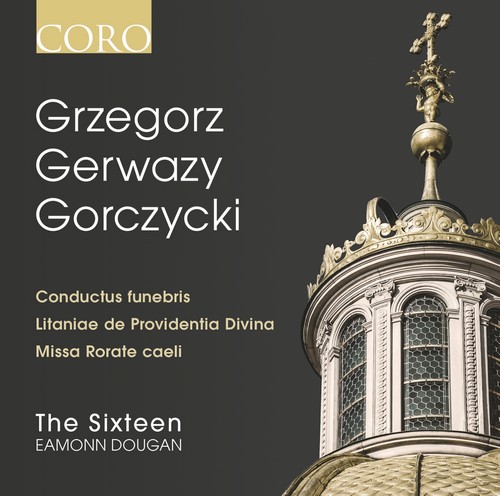
Seria: Polish series
Nr katalogowy: COR 16130
Nośnik: 1 CD
Data wydania: marzec 2015
EAN: 828021613029
Gorczycki: Conductus Funebris, Litania de Providentia Divina, Missa Rorate
Coro - COR 16130Grzegorz Gerwazy Gorczycki (1665-1734)
 Hejnał mariacki
Hejnał mariacki In Virtute tua
In Virtute tua O Rex
O Rex Illuxit Sol
Illuxit Sol Introit
Introit Missa Rorate - Kyrie
Missa Rorate - Kyrie Gloria
Gloria Gradual
Gradual Alleluia
Alleluia Offertory
Offertory Sanctus
Sanctus Benedictus
Benedictus Agnus Dei
Agnus Dei Missa Rorate - Communio
Missa Rorate - Communio Conductus - Subvenite
Conductus - Subvenite Conductus - Libera me
Conductus - Libera me Conductus - In Paradisum
Conductus - In Paradisum Conductus - Salve Regina
Conductus - Salve Regina Sepulto Domino
Sepulto Domino Litania de Providentia Divina
Litania de Providentia Divina
In virtute tua Domine
O Rex gloriae, Domine
Illuxit sol
Missa Rorate
Conductus Funebris
Sepulto Domino
Litania de Providentia Divina
The third disc in The Sixteen’s acclaimed series of Polish music, conducted by Associate Conductor, Eamonn Dougan, explores the work of Grzegorz Gerwazy Gorczycki (1665–1734). Regarded as the outstanding Polish composer of the high baroque, Gorczycki studied in Prague and Vienna in his early years and returned to Kraków in 1690 where he took holy orders. He was appointed Magister capellae at Wawel Cathedral in 1698, a position he held until his death. Like his predecessor Bartłomiej Pękiel (COR16110), Gorczycki wrote in both stile antico and stile moderno; the works featured in this recording display his skill in both genres. The Missa Rorate shows his mastery of counterpoint and sensitivity to word-setting, as does Illuxit Sol in which Gorczycki revels in the rhetoric of the text, painting it with lush five-part string writing; Conductus Funebris, a four-movement work setting text from the Burial Service, marries his contrapuntal skills with a more emphatic, declamatory style, while in the Litania de Providentia Divinae, Gorczycki unleashes the full power of his invention as he paints the virtues of "Divine Providence" with a glowing palate of colours.
Eamonn Dougan is The Sixteen's Associate Conductor and has conducted the group throughout the UK and Europe recently to great acclaim at the Concertgebouw, Amsterdam, at the Abbaye de Lessay, France and at the Queen Elizabeth Hall. Eamonn is also Principal Guest Conductor of The National Youth Choir of Great Britain and Chorus Director of Britten Sinfonia Voices. He is also a regular Guest Conductor with Wrocław Philharmonic Choir, Poland. Alongside Harry Christophers Eamonn co-conducted The Sixteen’s 2012 album The Earth Resounds and made his full conducting debut on CORO with 2013 recording ‘Bartłomiej Pękiel’.
Znakomity brytyjski zespół The Sixteen pod dyrekcją Eamonna Dougana oddał w ręce słuchaczy płytę z muzyką znakomitego polskiego kompozytora przełomu XVII i I połowy XVIII wieku Grzegorza Gerwazego Gorczyckiego. Warto nadmienić, że jest to trzecia płyta zespołu, której repertuar skupia się na muzyce obecnej w dawnej Polsce. Pierwsza z 2013 roku obejmowała muzykę Bartłomieja Pękiela, druga zaś z 2014 roku skupiła się na muzyce włoskich mistrzów działających w Polsce. W latach 1698-1734 Gorczycki pełnił funkcję kapelmistrza kapeli katedralnej na Wawelu w Krakowie. I to dla tego zespołu głównie pisał swoje kompozycje. Obecnie znamy 50 kompozycji tego wszechstronnie wykształconego kompozytora. Poza wymienionymi w tytule utworami na płycie znajdujemy trzy motety i jeden koncert wokalno-instrumentalny Illuxit sol. Są wśród utwory czysto wokalne, jak i wokalno-instrumentalne. Płytę otwiera Hejnał mariacki, co w tym wypadku jest dość znaczące. Wykonanie jest znakomite i mimo, że z muzyką Gorczyckiego w Polsce nagrano już trochę płyt to zdecydowanie to jest najlepsze. Wyczucie stylu, kultura brzmienia i wrażliwość na niuanse zawarte w tej muzyce są wprost zachwycające. Aż chciałoby się następnej płyty z kolejnymi utworami Gorczyckiego w takim wykonaniu.
Alina Mądry - Audio Video 05-2015


















